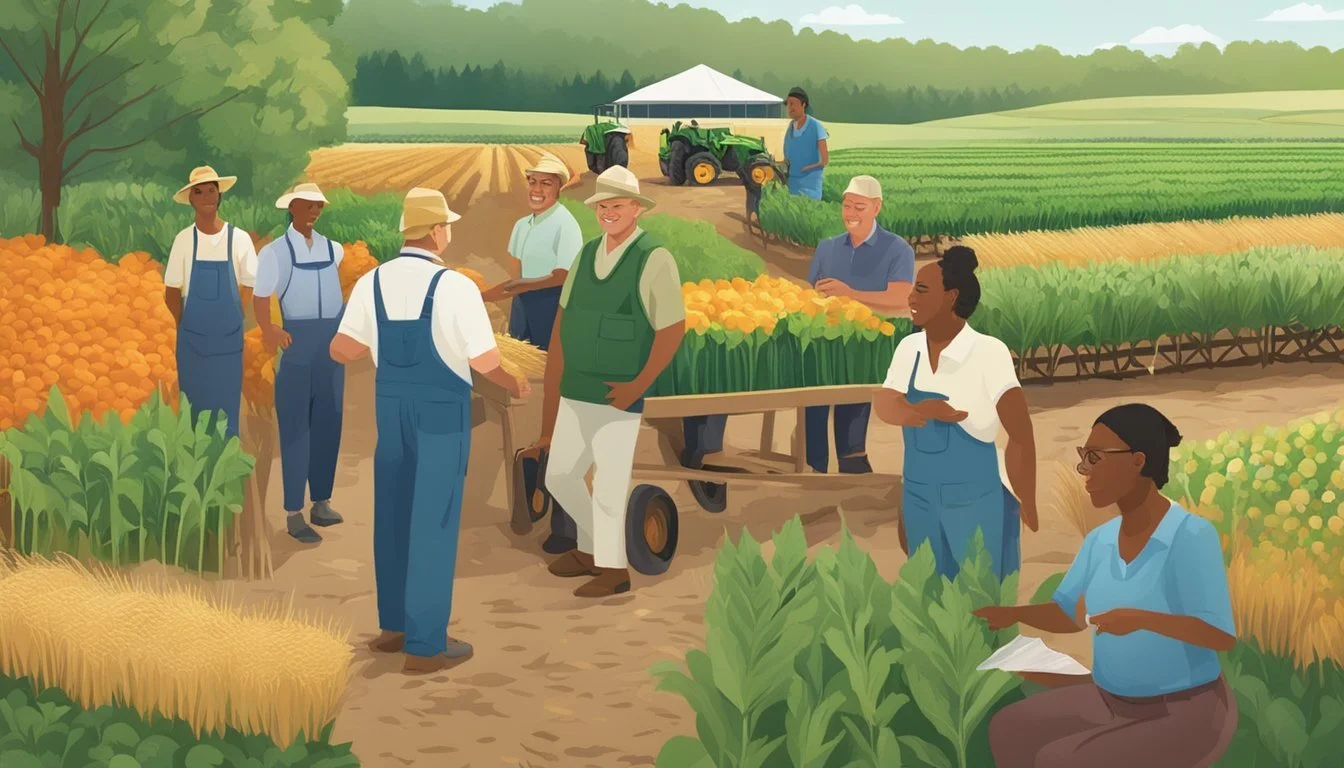Farm Loans in Massachusetts
Navigating Your Agricultural Financing Options
This Article is Part of Our Guide on Farm Loans for All 50 U.S. States
In the Commonwealth of Massachusetts, various programs offer financial aid and support to the agricultural community. These assistance measures are pivotal for new and established farmers, covering needs from emergency aid to expansion and sustainability projects. To this end, the state provides numerous grants, loans, and cost share programs, tailored to aid farmers in enhancing their productivity and market reach.
One prominent option for farmers seeking financial assistance is the microloan program administered by the USDA Farm Service Agency, specifically designed to support small farms, veterans, and disadvantaged producers. This initiative offers a more accessible entry point for those looking to start or maintain their agricultural ventures. Moreover, organizations like The Carrot Project bridge gaps in financing, offering loans that enable local farms to innovate and grow, favoring environmentally friendly organic operations.
For farmers prioritizing sustainable farming practices, Massachusetts extends support via the Agricultural Preservation Restriction (APR) Program which helps preserve and protect agricultural land, and grants are available for up to $50,000 to support various farm activities. In the sphere of certifications, the Organic Certification Cost Share program reimburses a chunk of the certification expense, easing the burden for farmers striving to meet organic standards. Collectively, these tools and resources form a robust framework for agricultural financial support within the state.
Overview of Farm Loans in Massachusetts
In Massachusetts, farmers have access to a variety of loan programs designed to support agricultural activities. These loans are pivotal for financing farm purchases, operational expenses, and enhancements necessary for farm sustainability and growth.
Types of Farm Loans
Massachusetts provides several types of farm loans to cater to the diverse needs of its agricultural community.
Direct Farm Ownership Loans (FO) enable farmers to purchase property, with maximum loan amounts currently set at $300,000.
Operating Loans (OL) help farmers cover the costs of day-to-day operations, with similar maximum amounts.
The Carrot Project specifically offers loans to small-scale farms to enhance operations, with a focus on organic practices.
Emergency Loans are available to address urgent financial needs possibly due to natural disasters.
State-specific initiatives also exist, such as financial assistance programs providing grants with a 1:1 match for developing commercially viable operations.
Role of USDA and FSA
The United States Department of Agriculture (USDA) and the Farm Service Agency (FSA) play critical roles in the administration of farm loans.
The USDA sets overarching policies and funding limits, while the FSA implements the programs through various FSA offices located throughout Massachusetts.
Special loan programs assist socially disadvantaged and beginning farmers, with the USDA providing a portion of the funding.
The FSA also offers guarantees on loans provided by commercial lenders to farmers, with guaranteed FO or OL amounts adjusted annually for inflation, currently up to $1,302,000.
These agencies ensure farmers have the necessary support to establish and grow their agricultural businesses within the state.
Eligibility and Application Process
Farm loans are essential for Massachusetts farmers who seek financial support for their agricultural businesses. This section breaks down the crucial steps and criteria involved in obtaining a farm loan, from understanding the eligibility requirements to utilizing available tools and resources.
Eligibility Criteria for Farmers
To qualify for USDA farm loans in Massachusetts, applicants must meet specific criteria. This includes being a farmer or rancher, having sufficient managerial experience, being unable to secure credit from other sources, complying with the U.S. citizenship or permanent residency requirements, and possessing an acceptable credit history. USDA loans are also tailored to support beginning farmers, to ensure new entrants in farming can access necessary capital.
Farm Operator: Active engagement in farming activities.
Managerial Experience: Demonstrable experience in farm management.
Credit History: Acceptable history indicating reliability.
Legal Status: Must be a U.S. citizen or a permanent resident.
Credit Ineligibility: Unable to obtain credit from alternative sources.
How to Apply for a Farm Loan
Farmers in Massachusetts can apply for a loan directly through farmers.gov or by visiting the local USDA Service Center. The application process typically involves the following steps:
Review Eligibility Requirements: Confirm you meet all qualifications for the loan.
Develop a Business Plan: Outline your farming goals and financial projections.
Gather Necessary Documents: Collect required financial and farm operation records.
Submit Your Loan Application: Complete the required forms, which can now be done online, including attachments of supporting documents and electronic signatures.
Applicants should ensure complete and accurate documentation to prevent delays.
Loan Assistance Tools and Resources
The USDA’s introduction of an online loan application offers an interactive guide that simplifies the application process. This paperless solution includes helpful features such as:
Electronic Signature Option: Provides convenience and expedites the process.
Supporting Document Attachment: Allows for a comprehensive application.
Additionally, the USDA offers loan assistance tools available on the Farmers.gov website, which offer guidance throughout the loan application process. Individuals with disabilities can request program information in alternative formats like Braille, large print, or audiotape by contacting the USDA's TARGET Center.
Financial Products and Services
Massachusetts farmers have access to a variety of financial products and services designed to support agricultural operations. These offerings include loans tailored for farm ownership or operational needs, with options for direct lending or guarantees, as well as specialized loans for smaller projects and younger farmers.
Direct and Guaranteed Loans
The Farm Service Agency (FSA) provides Direct Farm Ownership Loans and Direct Operating Loans for farmers who cannot otherwise obtain commercial credit. These loans allow farmers to purchase land, equipment, and supplies or to cover general operating expenses. To complement this, the FSA also offers Guaranteed Loans, which are made by lending institutions but guaranteed by the FSA up to 95%, providing lenders with the security needed to offer financial products to farmers.
Direct Loans: Maximum amount up to $600,000
Guaranteed Loans: Maximum amount up to $1,695,000 (as of 2023)
Microloans and Youth Loans
Microloans provide a simplified application process for funding up to $50,000, designed to meet the needs of smaller, non-traditional, and niche-type operations. These loans cater to the diverse needs of beginning farmers, veterans, and those from historically underserved demographics.
Microloans:
Max amount: $50,000
Can be used for working capital and farm purchases
Youth Loans are another specialized offering, providing support up to $5,000 for individuals between the ages of 10 and 20 to fund educational agricultural projects. These projects must be under the supervision of an organization such as 4-H or the FFA.
Youth Loans:
Max amount: $5,000
Eligibility: Ages 10 to 20, part of a recognized organization
Operational and Ownership Funding
Farmers seeking support for operational and ownership funding can find a variety of programs to assist with their financial needs. These include loans and grants for purchasing land or expanding operations. In certain cases, there are match requirements—such as reimbursement grants that require a 25% match for requests over $15,000. This underscores the commitment of both the farmer and the funding entity towards sustainable agricultural development.
For operating loans or farm ownership loans, applicants must show an acceptable credit history and demonstrate the ability to repay the loan.
Operational Loans: For day-to-day expenses, equipment, or livestock
Farm Ownership Loans: For purchasing land, constructing buildings, or soil and water conservation projects
Support for Specific Groups
Massachusetts offers tailored support to distinct groups in the agricultural sector, ensuring a more inclusive and sustainable growth within the farming community.
Beginning and Young Farmers
The Commonwealth of Massachusetts provides several initiatives to support beginning and young farmers, such as the Downpayment Program. This specific program assists socially disadvantaged and beginning farmers with purchasing land, helping to ensure that farming operations can be transferred to a new generation. Assistance is available through both direct and guaranteed loans, with the former capped at $300,000, while the latter can reach up to $1,302,000, an amount subject to annual adjustments based on inflation.
Programs for Small and Urban Farms
Small and urban farms benefit from a variety of programs aimed at increasing access to financial resources. The programs are designed to address the unique needs of small-scale operations and urban agricultural endeavors. These include reimbursement grants for certain expenses and initiatives like the Urban Agriculture Program, which focuses on the specific challenges faced by urban farmers, offering both technical support and financial assistance.
Assistance for Distressed Borrowers
For farmers facing financial adversity, the Inflation Reduction Act introduces the Discrimination Financial Assistance Program. It aims to provide financial assistance to those who experienced discrimination in USDA farm lending programs prior to 2021. This act reflects a commitment to correcting past injustices and offering a fresh start to distressed borrowers.
Conservation and Environmental Stewardship
In Massachusetts, farmers have the opportunity to participate in various programs aimed at conservation and environmental stewardship. These initiatives support the sustainable use of natural resources and encourage the adoption of conservation practices tailored to individual operation needs and environmental goals.
Conservation Loans and Practices
Farmers in Massachusetts can apply for Conservation Stewardship Program (CSP) loans that facilitate the enhancement of their existing conservation efforts. The CSP plans are customizable, offering assistance to farmers aiming to improve factors like grazing conditions, crop yields, and wildlife habitat. Moreover, the USDA has increased the minimum annual payment for new and renewed CSP contracts to $4,000 for the fiscal year 2024.
Key Conservation Practices:
Management of field borders and buffers to decrease runoff
Improvement of soil quality through cover cropping
Sustainable grazing systems to enhance pasture health
Water and Soil Resource Management
Preserving water and soil integrity is crucial for long-term agricultural productivity. The Environmental Quality Incentives Program (EQIP), with a funding pool historically announced around $250 million, offers financial backing for farmers devoted to water conservation and soil health.
Resource Management Strategies:
Installing irrigation systems for efficient water usage
Adopting no-till or reduced-till farming practices
Implementing nutrient management plans to optimize soil fertility and reduce chemical runoff
Managing Farm Operations
Effective management of farm operations in Massachusetts encompasses readiness for unexpected events, sufficient funding for ongoing expenses, and strategies to enhance production and marketing efforts. Third-party resources and government programs can be vital to addressing these needs.
Coverage for Disaster and Emergency
To mitigate the impacts of natural disasters, farmers often access financial assistance through various programs. The USDA Farm Service Agency's (FSA) Direct Farm Operating Loans provide a gateway for buffering against such emergencies. The Carrot Project also works with farmers in the Northeast, including Massachusetts, to secure the capital needed during unanticipated adversities.
Farm Operating Costs and Living Expenses
Operating loans are crucial for covering farm operating costs and family living expenses. FSA's Direct Farm Operating Loans help start, maintain, and strengthen farm or ranch operations. They cover costs such as seed, fertilizer, livestock feed, and also essential family living expenses. The maximum loan amount can reach up to $400,000, which ensures farms can function effectively throughout the year.
Marketing and Production Advancements
To stay competitive, farms need to invest in marketing and production advancements. Programs by the Massachusetts Department of Agricultural Resources (MDAR) and initiatives like the New Entry Sustainable Farming Project, offer guidance and resources for marketing improvements. They also provide insights into adopting innovative production methods that can lead to increased profitability and market reach.
Agricultural Economic Development
Massachusetts's commitment to agricultural economic development encompasses a multi-faceted approach which includes accessible financial support, structured business planning, and a robust local food system that both satisfies consumer demand and supports commodity markets.
Grants and Matching Funds
The Massachusetts Department of Agricultural Resources (MDAR) provides Grants and Matching Funds to stimulate growth and support projects within the agricultural sector. These include Matching Enterprise Grants for Agriculture (MEGA) that are designed to assist and propel the ambitions of Massachusetts farmers, particularly those in the early stages of their business development. These funds are critical for purchasing equipment, infrastructure improvements, or for marketing endeavors to enhance their agricultural enterprises' market presence.
Business Planning and Financial Risk Management
Effective Business Planning is pivotal for farmers to navigate the complex financial landscapes and to mitigate Financial Risk. Resources for building robust business models and risk management frameworks are essential. The Carrot Project, focused on small farms in Massachusetts, offers loans tailored to improving operational efficiencies and revenue, prioritizing those in organic farming. Additionally, the Entrepreneur's Guide to Farming in Massachusetts provides farmers with comprehensive fact sheets on business management practices, acknowledging the intricate nature of farm economics and the need for precise planning.
Local Food Systems and Commodity Markets
The health of Local Food Systems is directly tied to the performance of Commodity Markets in Massachusetts. The state's agriculture contributes significantly to the economy and excels in direct market sales, showcasing the success of their Community Supported Agriculture (CSA). Sustainable Agriculture Research and Education (SARE) and ATTRA offer guidance and resources which bolster local agriculture, ensuring that Massachusetts farmers are able to meet consumer demands while participating actively in broader commodity markets. Maintaining a balance between local food networks and larger market operations is essential for sustainable economic growth in the agricultural sector.
State-Specific Resources and Programs
In Massachusetts, a range of initiatives, regional support networks, and educational programs cater specifically to the needs of the agricultural community. These resources aim to provide financial assistance, preserve farmland, and bolster educational efforts for the benefit of all farmers within the state.
Massachusetts Department of Agriculture Initiatives
The Massachusetts Department of Agricultural Resources (MDAR) oversees several programs designed to enhance the viability and sustainability of agriculture in the state. One such initiative is the Matching Enterprise Grants for Agriculture Program, which offers financial aid to help established farms diversify their products, improve marketing, and ensure overall business improvement. Another pivotal program is the Agricultural Preservation Restriction (APR) Program, which works to permanently protect farmland by purchasing development rights, thereby ensuring the land's future use for agriculture.
Regional Agricultural Support
Beyond statewide efforts, regional organizations like the Berkshire Grown and Central Mass Grown are instrumental in promoting and supporting agriculture within their respective areas. These organizations focus on connecting local farms with consumers and providing farmers with resources for improving their market presence. Massachusetts farmers are also aided by groups such as the New England Vegetable & Berry Growers and the Massachusetts Association of Dairy Farmers, which serve specific sectors within agriculture, providing sector-specific support and advocacy.
Educational and Community-Based Programs
Education and community involvement are key in Massachusetts's agricultural landscape. UMASS Cooperative Extension Service operates as an educational arm for MDAR, facilitating research and knowledge dissemination to improve agricultural practices. 4-H Clubs and the Future Farmers of America (FFA) play a significant role too, fostering agricultural education among youth. The Community Involved in Sustaining Agriculture (CISA), through various educational agricultural projects, enables community members and schools to engage directly with farming and local food systems. This holistic approach underlies the state's drive to cultivate a knowledgeable, next-generation farming community.
Additional Support Services and Contacts
Farmers in Massachusetts have access to a variety of support services and resources that can assist them with loan acquisition and farm management.
Technical Assistance and Advisory Services
Farmers can receive technical guidance and advice through the Massachusetts Department of Agricultural Resources (MDAR). MDAR provides comprehensive aids tailored to meet the needs of new and established farmers, including educational workshops and farm management resources.
Networking with Local FSA Offices and Loan Officers
Local USDA Farm Service Agency (FSA) offices play a pivotal role in connecting farmers with knowledgeable loan officers. Farmers can utilize these local FSA offices to gain insights into the latest loan programs and financial assistance options available to them.
Massachusetts State FSA Office
Address: Specific address details
Contact: Phone number, Email address
Online Education and Loan Discovery Tools
The USDA offers an online platform where farmers can apply for Direct Loans, featuring an interactive application process with electronic signature capabilities. This initiative supports a paperless application system and makes it easier for farmers to submit their applications and attach supporting documentation as required.










